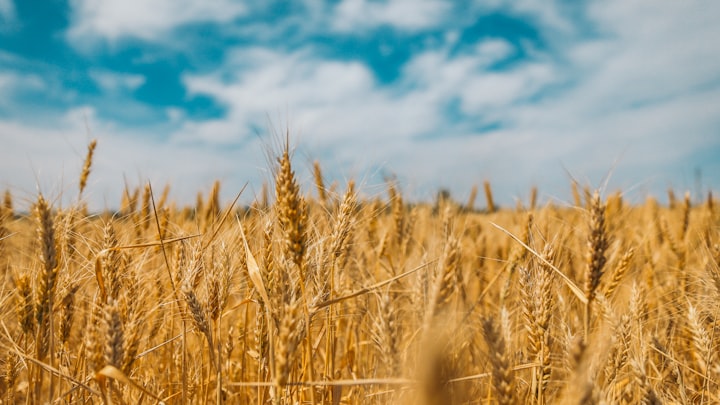
Wheat is a major cereal plant and one of the most successful species on Earth. From fighting poverty and hunger in developing countries to acting as a cheap and plentiful source of food, it has many important uses that we take for granted in modern society.
Nowadays, wheat can be found in everything from cookies to cosmetics, and we use it in everything from construction materials to paper products. It's no wonder that humans have used this plant since prehistoric times!
The History of Wheat
10,000 BC
Wheat is one of the most important cereal crops in the world. It has a history dating back to millennia and has been one of the most successful species on Earth.
Cultivation began in Mesopotamia, in a region historians call the Fertile Crescent, an area between the Tigris and Euphrates rivers that today stretches from Egypt to Iraq
The term "Fertile Crescent" refers to an arc of land from Turkey to Israel where early agriculture developed independently of crop breeding over thousands of years.
The earliest evidence of wheat cultivation was discovered at archaeological sites near Tel Rumeida in Palestine, dating from about 10,000 BC.
Around this time, humans used it to make flour, bread, and even beer! Wheat was even represented on clay tablets.
4000 BC
The wheat grains were eaten in a porridge mixed with fish and fruit. The "invention" of bread is attributed to the Egyptians, who, around 4000 B.C., discovered the process of fermentation of wheat.
More than just food to the Egyptians, wheat was traditionally offered to the gods or used in rituals. The cultural influence endures in many religious practices to this day.
2000 BC
From Mesopotamia, wheat spread around the world. The Chinese already knew about wheat about 2,000 years before Christ.
Wheat has left its mark across human history. Some say it also played a decisive role in the invention of writing: History tells us that the Sumerians created writing to record and control the trade of food surpluses - among them, wheat.
Middle-Age
However, it was not until 1320 that a French baker invented a technique of kneading wheat dough that did not require water - this made it possible for people to make soft bread without relying on expensive grains.
And it was at the hands of Europeans that wheat reached the Americas in the 15th century.
In Europe, wheat cultivation even expanded in colder regions, such as Russia and Poland.

Wheat: A Cross-Domestication Success Story
Wheat is the most successful crop in human history because of its versatility and suitability for various environments. Wheat can thrive in the cold, heat, dry land, and even when submerged underwater.
It is well known that wheat is grown in a larger area than any other crop and occupies a top position among the plants that produce more calories per acre.
It is also a good source of protein and micronutrients, which people who do not have enough access to dietary staples might need to supplement their diet.
The evolution of wheat has been a mix of natural and artificial selection. Humans have cultivated and improved wild varieties to produce bigger yields with less work needed to grow them.

Why is wheat so successful?
- Wheat, a single plant species, has been the most successful species on Earth for a few reasons.
- Wheat is one of the most important crops globally because it provides billions of people with nutritious food and a livelihood. Over 3 billion people rely on wheat as their staple food to survive, and the United Nations predicts that this will be around 4 billion by 2050.
- Wheat can grow in different environments and be used in various products like bread, pastries, and noodles.
- It also has a lot of health benefits and can fight poverty and hunger in developing countries by providing a reliable source of income for farmers.
- In addition to being a crop that provides sustenance, wheat also has many other uses, such as fuel, and paper products.
Closing thoughts
Wheat is one of the most successful species on Earth because it is versatile, adaptable, and can grow on any soil with enough water.
We all need to take responsibility to keep wheat successful in the future and make sure it plays a vital role in our lives.
Wheat has helped shape our planet and our lives and it will continue to do so for centuries to come.

Check out Originality AI, Jasper AI, Notion AI, or Undetectable.AI, and don't miss out on special gifts and all the latest and most innovative tools for creators. If you find my affiliate links, I may earn a small commission at no additional cost to you. Till next time, cheers. - Rui
About the Creator
Rui Alves
Hi, I'm Rui Alves, a teacher, army veteran & digital pathfinder. Author, alchemist of sound & Gen-AI artist.
Reader insights
Outstanding
Excellent work. Looking forward to reading more!
Top insights
Compelling and original writing
Creative use of language & vocab
Easy to read and follow
Well-structured & engaging content
Excellent storytelling
Original narrative & well developed characters
Expert insights and opinions
Arguments were carefully researched and presented
Eye opening
Niche topic & fresh perspectives
Heartfelt and relatable
The story invoked strong personal emotions
Masterful proofreading
Zero grammar & spelling mistakes
On-point and relevant
Writing reflected the title & theme






Comments (1)
Nice article, I found it very interesting.